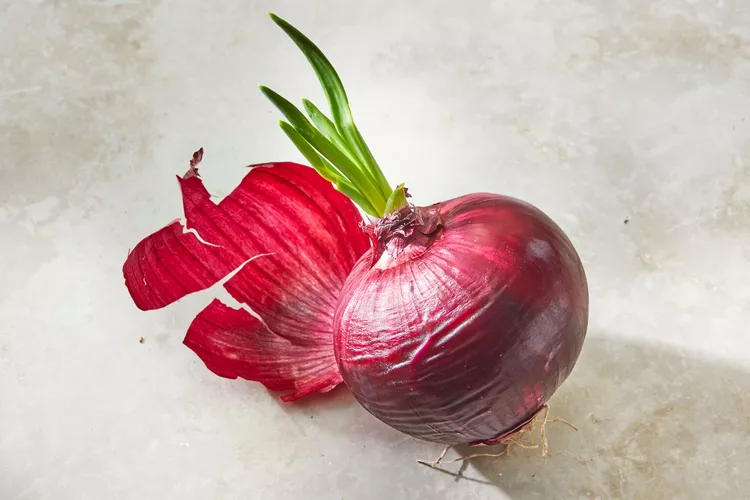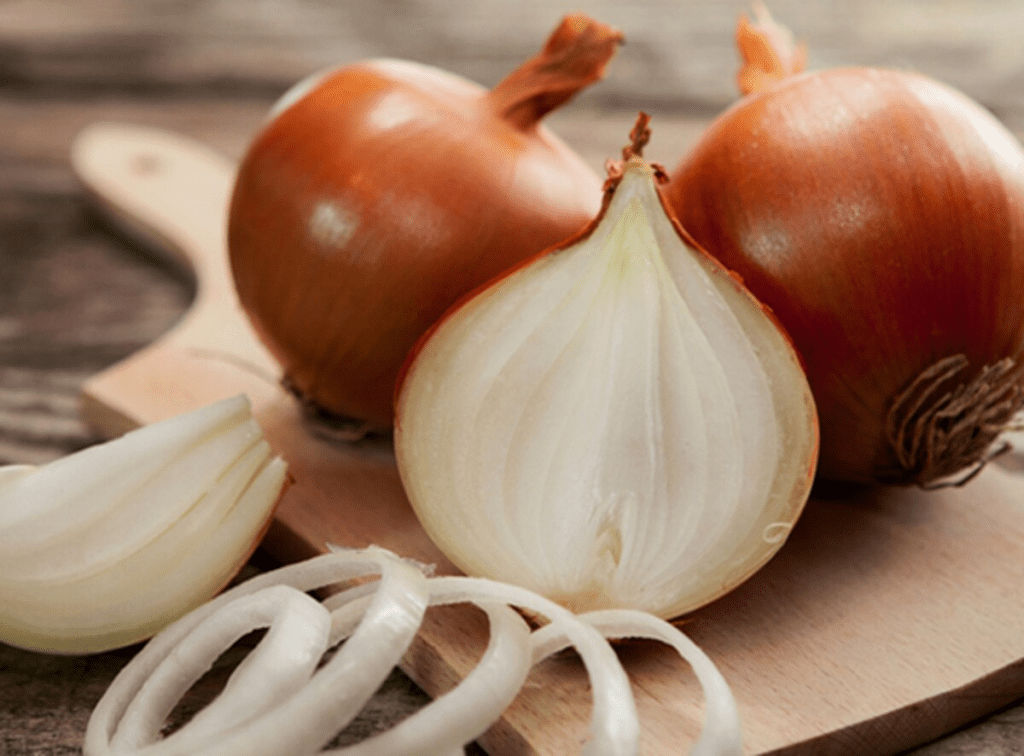When you reach for an onion to enhance your meal and spot green sprouts emerging from it, your first instinct might be to throw it out. But hold on! Should you really toss that onion just because it’s sprouted? Let’s uncover the truth behind sprouted onions and whether they’re still good to use in your recipes. Plus, we’ll explore how to store onions properly to prevent them from sprouting in the future.

Caitlin Bensel; Food Stylist: Torie Cox
What Does It Mean When an Onion Sprouts?
That green sprout emerging from your onion isn’t harmful—it’s simply a natural process. When an onion starts sprouting, it’s essentially beginning to regrow. Onions are bulbs, and bulbs are designed to reproduce. Under the right conditions—like exposure to light and warmth—an onion will sprout, as it’s trying to grow into a new plant.
Why does this happen?
Onions are quite sensitive to their environment. When stored for a while, especially if they’ve been exposed to sunlight or stored in a warm area, they will naturally begin to sprout. This is a signal that the onion is trying to continue its lifecycle.
Can You Still Eat an Onion That Has Sprouted?
The short answer is yes, a sprouted onion is still safe to eat. However, there are a few things you should keep in mind before tossing it into your salad or sautéing it in your stir-fry.
- Texture: As an onion sprouts, its bulb may become softer over time. The longer the sprout grows, the more the texture of the onion changes. Softer onions are still usable, but they might not be as firm as a fresh one.
- Taste: Sprouted onions can develop a slightly bitter taste, especially if consumed raw. Cooking, however, often neutralizes this bitterness, making sprouted onions more suitable for cooked dishes than for eating raw.
How to Use Sprouted Onions in Cooking
If you find a sprouted onion, don’t fret! There are still plenty of ways to make use of it without sacrificing taste or texture.
- Cook it: Since sprouted onions may taste a little bitter when raw, they’re best used in cooked dishes. You can fry, sauté, or bake them without noticing much difference. Whether you’re making soups, stews, or stir-fries, sprouted onions will perform just fine.
- Chop off the sprout: While the green sprout is technically edible, it doesn’t taste great. Simply chop off the sprout and discard it before using the rest of the onion in your recipe.
- Garnishes: If you prefer, you can use sprouted onions as a garnish, where the slightly altered flavor may not be as noticeable. Top off dishes like chili or roasted vegetables with these onions.
Remember, once an onion has sprouted, it’s best to use it quickly. The longer it sits, the softer and more bitter it will become, so it’s wise to move it to the front of your onion stash for immediate use.
How to Tell If an Onion Has Gone Bad
Sprouting doesn’t necessarily mean that the onion has gone bad. However, there are some signs you should watch out for to know if an onion is no longer fit for consumption.

- Rotting or mold: If your onion has started to grow mold or shows signs of decay, like mushy or dark spots, it’s time to toss it.
- Leaking: A good onion should be dry to the touch. If you notice any signs of moisture, especially if liquid is seeping from the onion, that’s a sure sign it’s spoiled.
- Foul smell: A fresh onion has a distinct, pungent aroma. But if it smells sour, musty, or off in any way, it’s no longer safe to eat.
How to Properly Store Onions to Prevent Sprouting
Want to prevent your onions from sprouting in the first place? Proper storage is key. Onions are quite sensitive to their environment, and improper storage can lead to early sprouting and spoilage. Here’s how to store them the right way:

- Keep them dry: Moisture is the enemy when it comes to storing onions. A damp environment encourages sprouting and can cause onions to rot. Avoid storing onions in plastic bags, as these can trap moisture.
- Avoid sunlight: Sunlight speeds up the sprouting process. Instead, store onions in a cool, dark place like a pantry or cellar. Ideal storage temperatures are between 45°F and 55°F.
- Don’t store them near potatoes: Onions and potatoes may seem like natural storage companions, but they’re not. Onions emit ethylene gas, which accelerates the ripening of potatoes. Store them separately to keep both fresh for longer.
- Use mesh bags: Store onions in breathable mesh bags or baskets. This allows proper air circulation, reducing moisture buildup and the risk of sprouting.
Can You Plant a Sprouted Onion?
Believe it or not, you can actually plant a sprouted onion and grow new onions. If you’re into gardening, sprouted onions offer an excellent opportunity to add to your crop. Simply plant the sprouted part of the onion in soil, and with proper care, you’ll soon see it grow into a full onion plant.
This is one of the ways gardeners ensure they always have a supply of onions without needing to purchase seeds. So, if you’re feeling adventurous, don’t just toss that sprouted onion—plant it instead!
Conclusion: Sprouted Onions—Toss or Use?
In summary, sprouted onions don’t need to go straight into the trash. They’re safe to eat, though they may have a slightly different texture and taste, especially if left unused for too long. Sprouted onions work best in cooked dishes where any slight bitterness won’t be noticeable. Remember to check for signs of spoilage, and store your onions properly to prevent sprouting in the future. By following these tips, you can make the most of your onion supply and reduce food waste.


